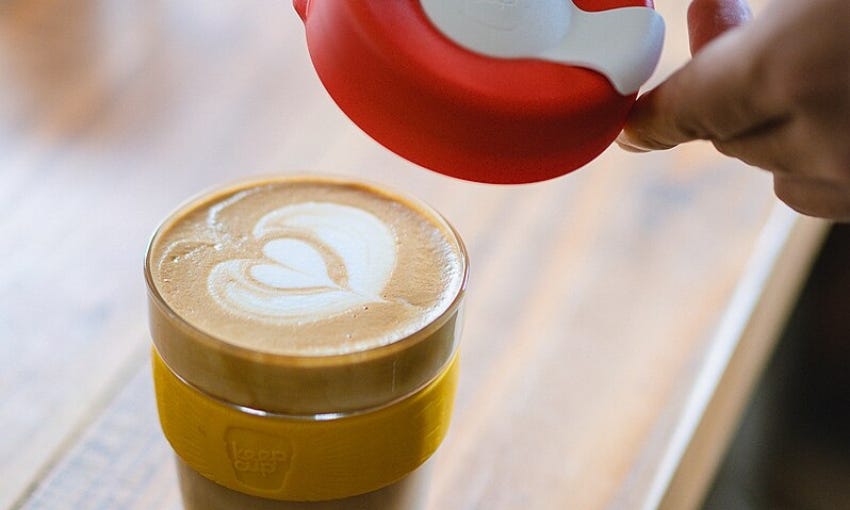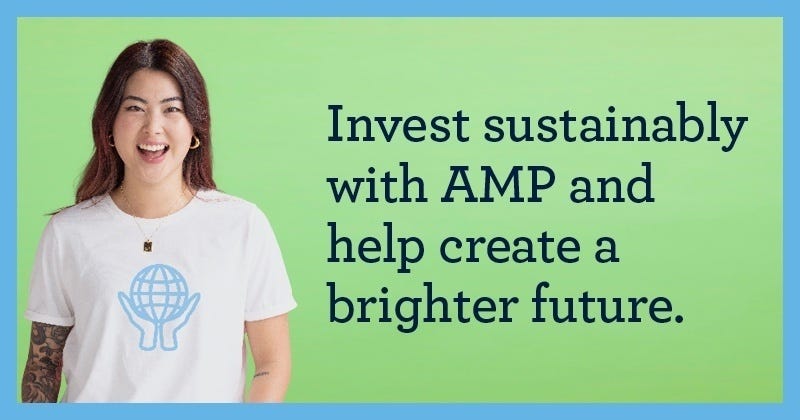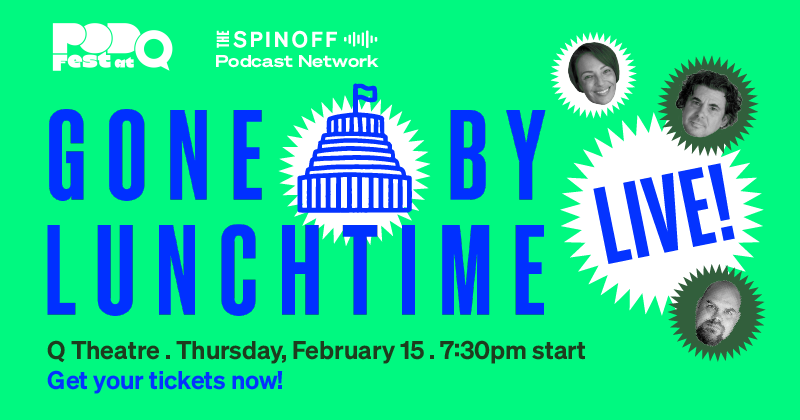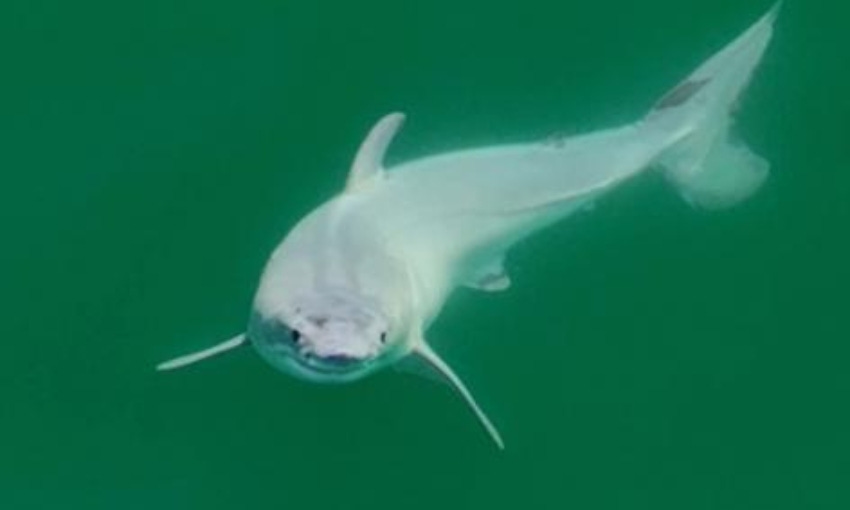Kia ora, welcome to Future Proof brought to you by AMP. I’m Ellen, thanks for joining me this week.
Image credit: Kenchenzoey via Wikimedia (CC BY-SA 4.0).
A reusable drink tumbler has exploded in popularity, becoming the must-have item for (mostly) young women. You’d think that would be a good thing – more people shifting away from single-use items. But when one functional cup turns into a vast collection of cups reminiscent of the 1990s beanie baby craze, things start to feel less like sustainability in action, and more like icky overconsumption.
The colourful Stanley tumblers aren’t the first reusable water bottle to become a must-have item – but this got me wondering, why haven’t reusable coffee cups seen anywhere near this level of popularity?
Back in 2018–2019, reusable coffee cups seemed to be on the up and up. Coffee Supreme tracked a slow but steady rise in their cafés, as reported by The Spinoff in February 2020.
But then the pandemic hit. During level 4 lockdown, an estimated 20 million disposable cups were saved from landfill as we stayed at home. When takeaways were back on the menu, however, many cafés temporarily ceased accepting reusable cups for fear of spreading Covid-19. Disposable was the only option if you were craving a flat white.
Almost four years on, it feels like the reusable cup trend never really picked back up again – convenience won, and we stuck to our disposable habit. New Zealanders consume as many as 295 million coffee cups every year. And even though they’re mostly made of paper, a pesky plastic lining means they can’t be recycled here in Aotearoa, so they end up chucked in landfill.
Some cafés offer a discount for people toting reusable vessels, but psychology tells us these “gains” aren’t as effective as the “loss” of having to pay extra for disposable, aka a “latte levy”.
But there’s another incentive that works too. Research from Australia found that mimicking those around us is a surefire way to encourage more people to ditch the disposable cups, and switch to reusable.
“You brought your own cup!” the woman standing next to me at the coffee counter exclaimed in surprise. I was retrieving my takeaway coffee the other day, in a glass cup I’ve had since 2019. I was equally surprised. “Yes,” I said, and smiled. Surely most people knew about reusable coffee cups in 2024?
This simple exchange was a reminder that not everyone lives in our eco-friendly bubble. It was also a reminder that individual action is never just about the individual. It’s about the people around us, too.
AMP believes that investing in a sustainable future is the best way to achieve long-term investment success. That's why they integrate environmental, social, and governance (ESG) factors into all of their investment decisions.
AMP supports companies that are making a positive impact on the world while avoiding those that are causing harm. AMP is also working to reduce its own carbon footprint and achieve a net zero outcome by 2050 or sooner.
One year on from the Auckland anniversary weekend floods
This time last year, Auckland’s heaviest recorded rainfall event inundated the city, killing four people, destroying homes and infrastructure, and cutting off communities. The Spinoff’s Gabi Lardies and Tommy de Silva comprehensively survey what has – and hasn’t – progressed in the year since, from managed retreat to repairs to making the city “spongier”.
New recycling rules come into effect tomorrow
Standardised recycling rules from 1 February 2024 mean that no matter where you are in the country, the items you can chuck in your kerbside recycling are the same: plastics 1, 2 and 5; paper and cardboard; glass jars and bottles; and aluminium tins and cans. The idea is to reduce confusion and contamination, and therefore boost the amount of waste that does actually get recycled (by up to 36,000 tonnes, the Ministry for the Environment estimates). As a result, the list of recyclable items in Auckland actually shrinks: no more lids, tetrapak, or aerosols. However, the changes won’t be rolled out for all councils: four have until 2027 to start collecting the full suite of materials. A further eight don’t currently have any kerbside collection, and no decision has been made about whether they’ll be required to start one up.
Short stories imagine life and climate in 2200
The winning stories for Grist’s Imagine 2200 climate fiction short story competition have been published, featuring snapshots of futuristic submarine housing, rewilding and floods. Among the nine finalists is a story from New Zealander Melissa Gunn, who writes about a family on a coconut farm in the Far North preparing for a storm surge.
See Gone By Lunchtime live at Q Theatre!
Gone By Lunchtime is taking the stage to bring its unique blend of insight, humour and irreverence to a very special live episode. Join The Spinoff’s Toby Manhire, along with Annabelle Lee-Mather (Ngāi Tahu, Ngāti Kahungunu, Ngāti Māmoe) (executive producer of The Hui) and Ben Thomas (former press secretary in the Key government), as they boldly step out of the studio and in front of an audience to cast a curious and caustic eye on New Zealand politics. Don’t miss this rare opportunity to see the 2023 winner of Best Politics Podcast (NZ Podcast awards) brought to life a Q Theatre as part of PodFest at Q.
When and where
7.30pm, Thursday 15th February
Q Theatre Rangatira – 305 Queen St, Auckland CBD
Click here to get your tickets now!
More stories
“There is a direct link between the pressures and pace of our lives, and the pollution and stagnation of the rivers we live next to”: Nadine Anne Hura reflects on four years of reporting Māori climate stories.
The creator of Succession donates to Greenpeace legal fund as a real life lawsuit by oil giant Shell mirrors a satirical cousin Greg storyline from the hit TV show.
What Antarctic octopus DNA tells us about our past and future sea level rise.
“Reinventing the eel”: the first lab-grown freshwater eel meat has been created.
Nature-centric indigenous languages hold knowledge unknown to western science, and may prove critical for protecting species in the midst of an extinction crisis.
New Zealand has made a “baffling” u-turn on a proposal to reduce bottom trawling of seamounts on the Pacific high seas, Andrea Vance reports for The Post (paywalled).
The trend towards supersized vehicles – whether they’re electric or petrol powered – must be reversed, this editorial in The Guardian argues.
The Spinoff is powered by its supporters
In 2023, Spinoff readers funded some of our most beloved, well-read and impactful work. Help Me Hera, The Cost of Being, powerful longreads, Election 2023 coverage, laugh out loud satire, Wellington stories, Christchurch stories and everything in between was powered by Spinoff members and donors. If you did support us, thank you from all of us at The Spinoff. If helping fund well-crafted and insightful journalism is on your list for 2024, donate today or sign up to become a Spinoff member.
Image credit: Carlos Gauna/The Malibu Artist.
To finish this issue, is this the first ever footage of a newborn great white shark? A wildlife photographer filmed the 1.5-metre-long pup off the coast of California, and it appeared to be shedding a whitish layer that some have theorised is embryonic fluid, meaning the shark might only be a few hours old. Some scientists, however, are sceptical and reckon the shark just has a skin condition. In other shark news, the extinct megalodon (aka the Meg) may have been longer and skinnier than previously assumed, and not so similar to the body plan of an XL chunky great white shark.
Have a jawsome week,
Ellen
Got some feedback about Future Proof or topics you’d like covered? Get in touch with me at futureproof@thespinoff.co.nz














I suggest that the usual reasons apply to our failure to use re-usable cups: convenience, idleness, aka not caring and, most of all, ignorance. We no longer have plastic or polystyrene cups; instead we have paper cups. Therefore, they MUST be recylable, otherwise why would we use them? Ignorance rules nine times out of ten: when most Kiwis (and other nationalities for that matter) believe that recycling is the best thing they can do to slow down the climate crisis, you know we have a lot of education still to do.
The comment about Covid reminds me of a truly bizarre incident the other day. I went into a cafe for a nice, vegan pie and a bottle of beer. The beer was presented to me, duly opened, in a bottle. I don't like drinking from a bottle, if there's an alternative and so I asked for a glass. The server said that, 'since Covid', she was not really supposed to offer a glass - which was also why I had to eat my pie out of a paper bag, instead of off a plate. I can only assume that the cafe didn't have a dishwasher, or that it was below standard. However, the incredible irony of this was not only that my bottle, undoubtedly, had been handled by many people, but it had foil wrapped around its neck - a far from hygienice concept. And yet it was OK for me to wrap my mouth around this, but not for me to pour the beer into a clean glass!
And why has the Government made a U-turn on bottom trawling? I suspect Shane Jones would be the answer.